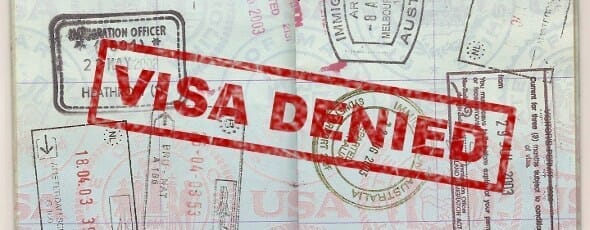
It can be nerve-wracking to apply for a U.S. travel visa when you aren’t sure what to expect! It’s always at the discretion of the U.S. government to either approve or deny your travel visa, and it’s an unfortunate reality that denials do happen.
Before you apply for your travel visa, here are some common mistakes people make during the travel visa process that may lead to a denial. Familiarizing yourself with these denial reasons now can help you avoid them down the road.
- Errors on Your Form DS-160
The first step in the B-1/B-2 travel visa process is completing Form DS-160 (the Online Nonimmigrant Visa Application). It’s important to answer each question truthfully and accurately, to avoid a denial based on incomplete information or misrepresentation. If you do make a mistake or forget to answer a question on your form, don’t panic! Read Boundless’ guide on how to edit your DS-160 after submitting it online.
- Applying From a Third Country
Generally speaking, it is more difficult to apply for a travel visa when you’re not living in your home country. Denial rates are higher on average for those applying from a “third country”, but it is still possible to overcome this during the application process and receive an approval. Boundless put together a guide with helpful tips on how to apply for a third country here.
- Applying From a Country With High Denial Rates
Some countries have higher travel visa denial rates on average than others. Although it can be difficult to avoid a denial when applying from a high-risk country, putting together the strongest application possible and gathering additional evidence to support your case is likely to help. Check out these tips for travel visa approval.
- Failing to Make a Clear Travel Itinerary
Your visa application is more likely to be denied if you do not present the U.S. government with a clear and detailed itinerary for your trip to the U.S. Visa officers want to understand your reason for traveling to the U.S., where you will be staying during your trip, and for how long. Failure to provide this information could result in a denial, so make sure to gather your travel details before applying!
- Financial Issues
Another common reason for travel visa denial is failing to show you can support yourself financially during your time in the U.S. The government will want to confirm that you have enough funds to cover all expenses related to your trip, including airfare, accommodations, and any other costs that may arise when you travel. You can avoid a denial based on a lack of financial evidence by gathering strong supporting documents, such as pay stubs, proof of assets, and more.
- Failing to Prove Strong Ties to Home
Another important aspect of the travel visa process is proving strong ties to your home country, and being able to demonstrate to visa officers that you intend to use the visa for its intended purpose: temporary, short-term tourism. If you’re not able to convince the visa officer in question that you will return home when your visa expires, you’re more likely to be denied. Read up on how to prove strong ties to your home country so you can apply with confidence.
- Previous Visa Denial
If you’ve been denied for another U.S. visa in the past, it may increase your chances of being denied again for a travel visa. After receiving a denial, it’s best to request clarification from the visa officer on the reason for the denial, so that you can better prepare in the future and avoid previous mistakes if possible.
- Prior Immigration Violations
Similar to a prior visa denial, prior immigration violations may also put you at a higher risk for travel visa denial. For example, if you overstayed a temporary visa in the past, such as a student visa or another travel visa, visa officers may assume that you will violate your new travel visa if approved. Be sure to learn more about visa overstays and other common immigration violations such as “unlawful presence,” so you can know what to expect for future applications.
- Being Unprepared for the Visa Interview
Every applicant is expected to attend a visa interview at a U.S. Embassy or consulate as the last step in the travel visa process, and there’s no denying this can be stressful and intimidating! Failing to show up for your interview on time, being unable to answer the interviewing officer’s questions, or misrepresenting yourself during the interview can all lead to a visa denial. We’ve put together a helpful guide to demystify the travel visa interview so you can prepare well ahead of time. You can even practice for your interview with this list of sample travel visa interview questions.
- Criminal History
Having a criminal record may make you inadmissible for a U.S. tourist visa, depending on the type of crime committed. Not all crimes automatically result in inadmissibility, but it can be more difficult to overcome a criminal history during the application process. Depending on your specific situation, you may be eligible to apply for a “Waiver of Inadmissibility,” which could increase your chances of travel visa approval. In this case, it’s best to speak with an immigration attorney to discuss your options.
Applying for a B-1/B-2 visa is never a guarantee, but Boundless can help you file the strongest application possible. Our software assesses your risk of travel visa denial based on your specific situation and our experienced team helps you avoid common mistakes. Get started today!